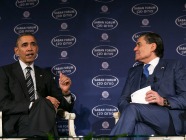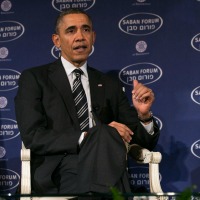
This week, Alpher discusses the seemingly significant high-level developments and statements regarding both the Israel-Arab peace process and Iran, against the backdrop of Israeli-American relations, how does the American security plan or "thoughts" challenge Netanyahu's security concept regarding the Jordan Valley, what is the significance of Obama's mention of a framework agreement as a negotiating outcome, what is the significance of Netanyahu's linkage of Iran and the two-state solution at the Saban Forum, and thoughts on Nelson Mandela's support for the Palestinians and consistent criticism of Israel.
Q. The past week witnessed a number of seemingly significant high-level developments and statements
regarding both the Israel-Arab peace process and Iran, against the backdrop of Israeli-American relations. Can you
sort them out?
A. First, here is a checklist of what transpired.
Beginning with the Palestinian issue, Secretary of State John Kerry and General John Allen presented in Jerusalem
and Ramallah American "thoughts" regarding a security regime for the Jordan Valley as part of a two-state solution.
Kerry allowed that the current peace talks could extend beyond the nine month period that expires in April.
President Barack Obama suggested a "framework agreement" as a more realistic goal for the current talks than an
end-of-conflict treaty. Former Shin Bet head Yuval Diskin sharply criticized the Netanyahu government's handling of
the peace process and stated that a two-state solution was more important to Israel's security than an Iran nuclear
deal. And senior coalition partner Yair Lapid (Yesh Atid) stated, after being briefed by Kerry, that progress
toward a peace agreement would require changes in the coalition (meaning, presumably, that Labor would replace the
more right-wing coalition members).
Turning to Iran, Obama and PM Binyamin Netanyahu both concentrated on the nuclear issue in their addresses to the
Saban Forum in Washington. They appeared broadly to agree on the elements of Iran's nuclear program that need to be
dismantled in accordance with a permanent agreement based on the recent Geneva deal. Obama suggested the chances of
success were about 50-50. But Netanyahu argued that without disarming Iran it would be impossible to reach a
two-state solution and that, indeed, Israel's existing peace agreements with Egypt and Jordan would be
jeopardized.
Q. Let's start with the American security plan or "thoughts". How does the plan challenge Netanyahu's
security concept regarding the Jordan Valley?
A. This was the first instance in the current peace process whereby the US intervened with ideas of its own,
thereby seemingly signaling that Washington is becoming impatient. According to media reports, Kerry and Allen
presented a plan whereby Israeli forces remain along the Jordan River and man border crossings together with
Palestinians for a transitional period, with the US supplying sophisticated surveillance activities and equipment.
The plan challenges the Palestinian demand that not a single IDF soldier remain on Palestinian territory, and
challenges Netanyahu's demand for an Israeli presence in the entire Jordan Valley for an indefinite period of time.
The Palestinians appear to have rejected the plan outright.
The real challenge here for Netanyahu concerns his insistence that territory equals security. Many Israeli security
experts, most recently from the Council for Peace and Security, have argued that in an age when Israel is not
threatened militarily by Arab land armies but is threatened by long-distance missiles and rockets that ignore
terrain, the Jordan Valley is less important than Netanyahu makes it out to be. Indeed, it has always been tempting
to believe that Netanyahu, like so many on the Israeli ideological right, simply covets the territory of the West
Bank and uses security as a flimsy rationale. He presumably realizes that an extended Israeli presence in the broad
Jordan Valley renders a Palestinian state non-viable and apparently hopes thereby to continue getting away with
blaming the Palestinians exclusively for intransigence. Netanyahu's approach to the Jordan Valley has also
constituted a kind of backhanded insult to Jordan, which has for years maintained near 100 percent security on its
side of the border, thereby to a large extent obviating Israel's alleged concerns about terrorist
infiltration.
Kerry opted for the US to present a security plan for the Jordan Valley before any other aspect of a two-state
solution in order, ostensibly, to call Netanyahu's bluff. You are holding up serious negotiations because you
insist that security arrangements be agreed prior to borders? Here is a plan that gives you security without
territory. Now talk about borders.
Thus far Netanyahu has astutely allowed the Palestinians to object to the plan while he "studies" it. According to
one report, the Palestinian rejection has prompted Kerry to announce a punitive delay in the third prisoner release
scheduled for the end of this month. But even Israeli security experts not affiliated with Netanyahu will
undoubtedly wish to modify the plan, too, particularly insofar as it relies on American rather than Israeli
surveillance. That's why the Americans sensibly termed the plan "thoughts". Whether this attempt to deal with the
security issues will now succeed in getting the Israeli-Palestinian talks moving remains to be seen.
Q. And Obama's mention of a framework agreement as a negotiating outcome: what is its
significance?
A. Obama and Kerry, but also Netanyahu and PLO leader Mahmoud Abbas, all stated at the outset of the current
negotiations in July that the objective was to reach a two-state, end-of-conflict agreement in nine months. It
seemed obvious to many observers that, even in the best of circumstances, this was impossible to accomplish in the
time allotted. Put bluntly, Kerry and Obama seemed naive, while Netanyahu and Abbas cynically played along to keep
Washington happy.
But perhaps they weren't quite so naive. Having maneuvered the Israelis and Palestinians into negotiations, Kerry
has begun to talk of extending the nine-month timeline, while Obama has allowed that a more general framework
agreement that gives the parties incentives to continue negotiating beyond April might be more realistic.
Conceivably, this is an indication that limited but significant progress is deemed possible. Yet this new
flexibility regarding a deadline appears also to serve Netanyahu's objective of negotiating open-endedly while
continuing both to build settlements and to maintain his disparate coalition with its pro-peace and pro-settler
components.
The new flexibility might also be said to serve a presumed Obama administration objective of maintaining the peace
process as a going concern at least through the November 2014 midterm elections. But it does not serve Abbas
politically: he has pledged to renew Palestinian appeals and applications to join international institutions as a
recognized state if and when the nine months expire without an agreement.
Q. Speaking to the Saban Forum, Netanyahu firmly linked Iran and the two-state solution. Where does this
leave us?
A. We predicted recently in these virtual pages that Netanyahu would balk at concessions to the Palestinians
because of his displeasure with the Geneva deal between the P5 + 1 and Iran. Now, by stating that if Iran even
retains a military nuclear potential peace between Israel and the Arabs will be endangered if not impossible, he
appears to have gone a step further. His statement also feeds Palestinian accusations that the US has acceded to an
ongoing Israeli security presence along the Jordan River precisely in order to compensate Netanyahu for the
drawbacks of the Geneva deal.
What is striking about Netanyahu's new linkage is that when talking about what has to be removed from the Iranian
nuclear program in a final deal, he and Obama seemed to be in fairly close agreement. In general, Netanyahu has
dropped his threatening "disaster" tone in talking about Geneva. He also, to his credit, called at the Saban Forum
for the US to address not only Iran's nuclear capabilities but its genocidal rhetoric toward Israel--a serious
lacuna in the recent Geneva deal.
All in all, we may sum up the current status of US-Israel-Iran-Palestine interaction by noting that, despite
Kerry's buoyancy, there appears to be more room for optimism that Jerusalem and Washington will cooperate regarding
the next phase with Iran than regarding the Palestinian issue. This, despite Diskin's pointed warning--ridiculed by
Netanyahu--that the Palestinian issue is actually more important to Israel's security than Iran.
Q. Finally, with the death of Nelson Mandela, any thoughts on his support for the Palestinians and
consistent criticism of Israel?
A. With so much of the world currently condemning Israel's approach to the Palestinian issue, there would seem to
be nothing remarkable about Mandela's criticism. Except, of course, for the fact that it goes back more than 20
years, to the height of the Oslo period when most of the world was optimistic about Israeli-Palestinian peace. This
is apparently because Mandela's attitude had two very specific, hence historically notable, roots.
First, until the end of apartheid in South Africa, Israel was involved in close security coordination with the
Pretoria regime that oppressed the country's black majority. This was rationalized at the time with reference to
vital Israeli security needs concerning strategic weaponry that the apartheid regime helped finance and supply, as
well as concern for the welfare of South African Jewry. Of course, with the passage of time that rationale looks
increasingly thin and hard to justify, but at the time it seemed to make sense in realpolitik terms to the Israeli
security and political community.
Second, Mandela's ideological roots in the African National Congress linked him to a kind of "international" of
national liberation movements in Africa and elsewhere in the 1960s and 70s that enjoyed solid Soviet support and in
which the Palestine Liberation Movement was a member in good standing. It is impossible to exaggerate the formative
influence this brotherhood had on its member leaders, whether from South Africa, Zimbabwe, Algeria or
Palestine.
Israelis today celebrate Mandela's life and legacy along with the rest of the world. But it appears that Israel is
sending President Shimon Peres to the Mandela funeral rather than Netanyahu not only because, for unexplained
reasons, the costs of transporting and protecting Bibi and Sara are far higher, but also because Peres (despite his
involvement decades ago in Israeli-South African security ties) is considered more acceptable to the South African
leadership than Netanyahu.